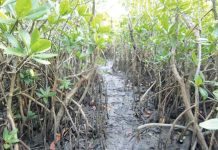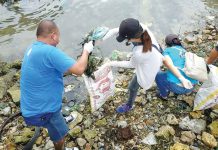
THE House Bill (HB) 9147, or the Single-use Plastic Products Regulation Act, was unanimously approved on the third and final reading by the House of Representatives (HOR) on July 28, 2021.
The World Wide Fund for Nature (WWF) Philippines lauded the HOR for the passage of the bill.
“The passage of HB 9147 is a step in the right direction,” said Ina Guingona, WWF’s No Plastics in Nature’s Policy officer.
“Plastic pollution has been a scourge to our environment and our communities. A more integrative approach that is grounded and solutions-focused is needed to address the multifaceted issue of plastic pollution. The passage of this bill signifies the Philippines’ commitment to tackling the problem in a holistic manner,” she added.
According to one of the principal authors of the bill, Rep. Greg Gasataya of Bacolod City, HB 9147 aims to regulate and stop the manufacturing of single-use plastics as one of the solutions to the country’s pollution problem.
“Is it time that the government will make a law prohibiting the use of plastic products that cause pollution,” the lawmaker said.
“Ang HB 9147 nagatuyo nga mag-regulate sa manufacturing, importation, kag pag-gamit sang single-use plastic products. Nalakip man diri ang paghatag sang nagakaigo nga multa kag incentives sa mga industriya kag business enterprises,” he stressed.
In 2019 Gasataya filed HB 574 but was substituted to HB 9147 because they are of the same version.
HB 9147 is one of several bills pending in Congress that include Extended Producer Responsibility. This scheme, advocated by WWF, is a policy tool that holds producers accountable for the plastic packaging they put into the market throughout the whole life cycle of the product.
On banning single-use plastics
Unnecessary single-use plastic materials, including plates, saucers, cups, bowls, lids, cutlery like spoons, forks, knives, and chopsticks, will be phased out with medical exemptions within four years from the effectivity of this Act.
Other materials such as drinking straws, stirrers, sticks for candy, balloons, cotton buds, buntings, confetti, and packaging bags of less than 10 microns, will be phased out one year from the effectivity of the Act.
The production, importation, sale, distribution, provision, or use of the said plastic products shall be prohibited. Properly labeled flexible disposable plastic drinking straws for persons with special medical conditions shall be allowed when no suitable reusable or compostable alternatives are available.
A report launched by WWF in October last year showed the challenges for waste management in the country.
It said more than two million tons of plastic waste, 15.43 kilograms per capita per year, is generated annually in the Philippines, 760,000 tons or 35 percent are leaked to the open environment while 706,000 tons or 33 percent go to landfills and dumpsites while only nine percent is recycled.
“We hope the positive momentum brought by the passage of this bill will continue through the Senate and eventually, to the Office of the President. Our work is cut out for us, from the need to eliminate unnecessary plastics, redesigning the way we consume things, to implementing waste reduction and management as mandated by RA 9003 or the Ecological Solid Waste Management Act, there is clearly so much work to be done to address the plastic pollution problem in the country,” said Czarina Contantino- Panopio, No Plastics in Nature’s National Lead.(WWF-Philippines/PN)



